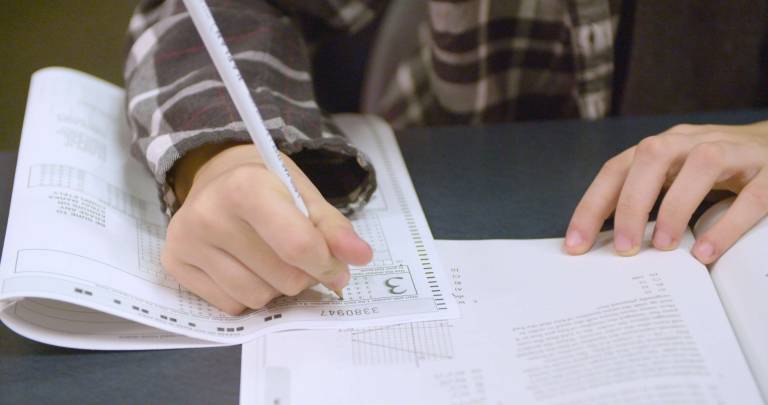An early start on college stress

High school is often heralded as an opportunity for students to expand to their minds, hone their interests and develop into the people they hope to become. While certainly a trying period in the lives of adolescents, those four years are meant to be dominated by growth rather than pressure. But in recent years, the balance between appropriate and overwhelming stress has become an increasingly challenging one to strike, and it’s due to the looming expectation of one thing: the college process.
Within the past decade, the experience of applying to college has undergone many changes: schools have become more selective, the outcomes more unpredictable and the process itself has been starting earlier with each passing year.
“There used to be a much greater ability to predict what the outcome would be,” said Lisa Shambaugh, a college counselor who has worked for over 15 years at the Packer Collegiate Institute, an independent school in Brooklyn Heights, where I am currently a junior. “There would be schools where we would have been very comfortable saying what a decision would be, whereas now it’s much harder to do that.”
Claudia Mendez, another college counselor at Packer with 12 years of practice, added that “overall the process is just starting earlier and earlier.”
As a result, the perpetual unease that the college process induces is dominating a greater percentage of a student’s high school career, making it difficult to learn simply for the sake of learning, rather than for the sake of moving on to the next stage of life.
Daisy Zuckerman, a junior at Packer, named sophomore year as the time when she began to consistently think about college, meaning that over half of her high school trajectory has been influenced by the prospect of what will happen next. Though Zuckerman had one year of high school where college was not of concern to her, she worries that her younger sister will not be granted that same luxury.
“I went to San Francisco recently with my family and we walked around Stanford,” Zuckerman said. “My thirteen-year-old sister decided that it was where she wanted to go. She was literally planning out her high school so that she could get in. You shouldn’t have to worry about that as an eighth grader.”
Nila Fortune, a third college counselor at Packer who, like Shambaugh, has held the position for 15 years, echoed a similar sentiment about the PSAT, a practice SAT taken by sophomores and juniors.
“When we hear that someone has been working with a tutor to prepare for the PSAT, that just seems totally inappropriate. To me, it’s a practice test, so you shouldn’t start stressing about it,” said Fortune.
While Shambaugh, Mendez and Fortune all think it’s entirely healthy for students to consider college when selecting their classes, they all agree that the heightened level of stress associated with the process is not always helpful. They also emphasized that not all students have the resources to help them cope with their worries as do those at Packer.
The college-related stress present in many high schools is perpetuated by families, friends, or internal pressure.
“Everyone talks about the SAT and ACT which ... kind of leaves a sense of stress in the group,” Zuckerman said.
While many parents have admirable intentions when asking about college plans, the probing can leave the student feeling more on edge. Shambaugh urges parents to trust their child’s judgment, maturity and ability to ask for help when it is wanted or needed.
Zuckerman commended her parents for making it clear that they will be happy with wherever she ends up, which has alleviated much of the pressure which some other students face, but underscored that parents are not the only family members who can inadvertently encourage anxiety.
“Whenever we have holidays my relatives come and are like, ‘Where do you think you’re going to college? What are you interested in?’” said Zuckerman. With a slight laugh, she added that “they even ask me what I want to major in.”
Perhaps unsurprisingly, Zuckerman said social media was one of the largest enforcers of application anxiety. Students posting about their own acceptances or their friends’ furthers the comparison inherent in the application process.
Though the years of applying to college are inevitably tainted by a degree of stress, it is imperative that both students and their parents remember how many different ways there are to define success.
“I feel like every article I ever read in a newspaper makes people afraid, and I get why that is, but there are so many great schools,” said Fortune. “How successful you’re going to be depends far more on how you’re going to use those years than the name on the diploma. I know some people will disagree with that, but I actually think it’s true.”